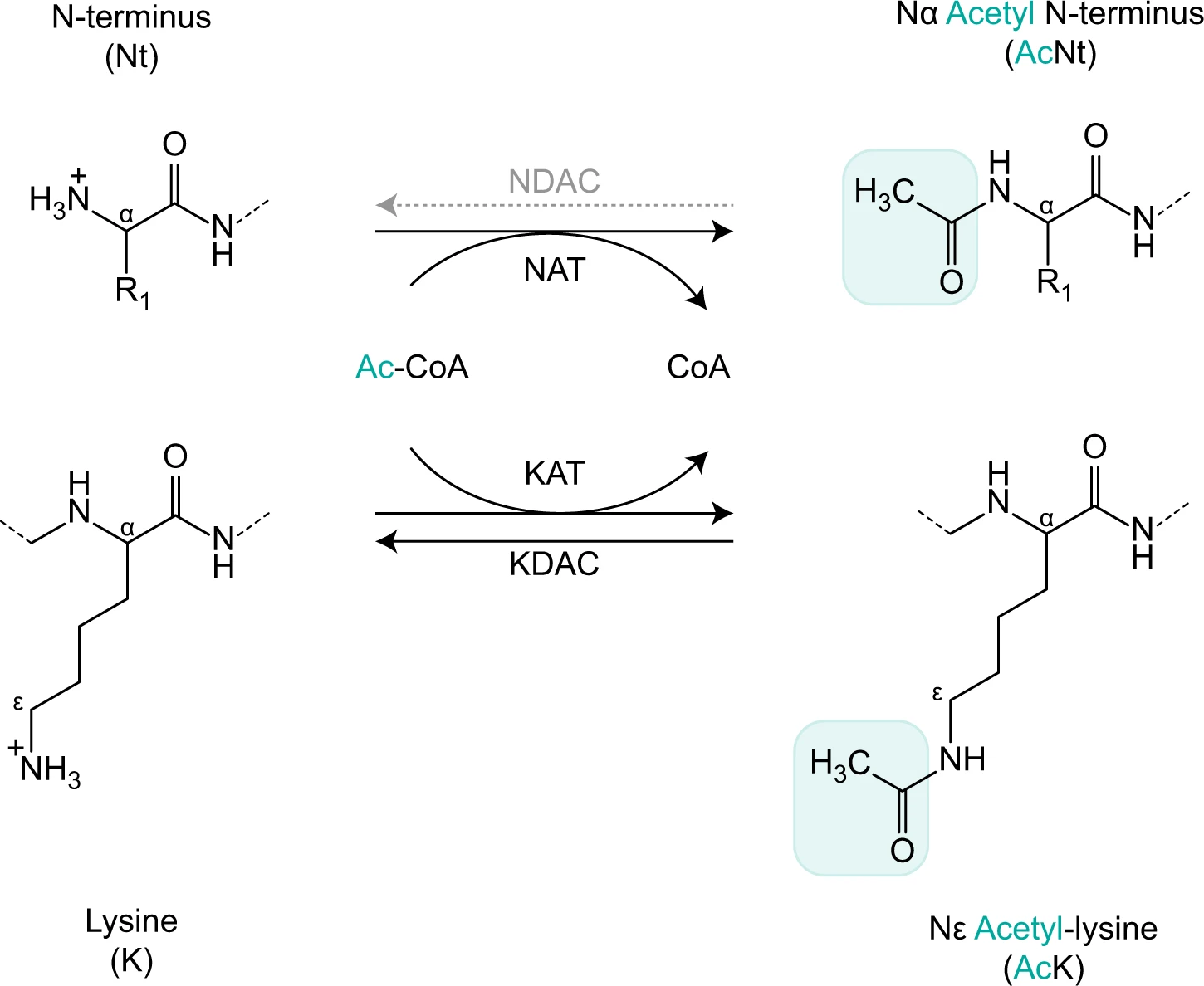Acetylation Site Identification Service
- Epigenetics research (e.g., profiling of histone acetylation modifications).
- Cancer mechanism studies (such as acetylation regulation of key proteins like p53 and c-Myc).
- Metabolic regulation and cellular signaling pathway analysis.
- Drug mechanism of action studies and target validation.
- Construction of post-translational modification networks (in combination with phosphorylation, ubiquitination, etc.).
Acetylation Site Identification Service refers to a specialized service that utilizes high-resolution mass spectrometry to accurately identify and annotate acetylation sites on proteins. This service supports research in areas such as epigenetic regulation, metabolic reprogramming, tumor signaling pathways, and drug target mechanisms. It is applicable to a wide range of fields including basic life science research, drug screening, biomarker discovery, and the development of therapeutic strategies.

Ree R. et al. Exp Mol Med. 2018.
Protein acetylation is a common and important type of post-translational modification (PTM), typically occurring at the ε-amino group of lysine residues. It is not only widely present in histones, where it regulates chromatin structure and gene transcription, but also plays a critical role in the functional modulation of non-histone proteins. Acetylation affects protein stability, enzymatic activity, subcellular localization, and protein-protein interactions. With the advancement of epigenetics and functional proteomics, acetylation research has become central to understanding cell fate, signal transduction, and disease mechanisms.
Due to the typically low abundance of acetylated peptides and potential interference from other modifications, affinity enrichment using highly specific anti-acetyllysine antibodies is required. These enriched peptides are then subjected to high-resolution LC-MS/MS for accurate mass determination and fragmentation analysis. Acetylation sites are identified through database searching and computational annotation.
Services at MtoZ Biolabs
1. Target Protein Acetylation Site Identification
MtoZ Biolabs utilizes a high-resolution LC-MS/MS platform to achieve precise localization and quantitative detection of acetylation modifications on specific target proteins. By enriching acetylated peptides and identifying modification sites, MtoZ Biolabs assists researchers in uncovering the regulatory roles of acetylation in protein structure and functional modulation.
2. Acetylation Proteomics Site Identification
MtoZ Biolabs integrates antibody-based acetylated peptide enrichment with high-throughput LC-MS/MS analysis to perform large-scale identification of acetylation sites across the proteome. This service enables the comprehensive profiling of acetylation dynamics under different biological states, supporting studies on cellular signaling, metabolism, and epigenetic regulation.
Analysis Workflow

Luu J. Carabetta VJ. mSystems. 2021.
The main workflow of Acetylation Site Identification Service is as follows:
1. Sample Preparation
Proteins are extracted and subjected to reduction, alkylation, and enzymatic digestion.
2. Enrichment of Acetylated Peptides
Acetylated peptides are selectively captured using anti-Kac antibodies through immunoaffinity enrichment.
3. LC-MS/MS Analysis
Peptides are separated and analyzed using high-resolution liquid chromatography–mass spectrometry platforms.
4. Data Analysis
Acetylated peptides and modification sites are identified, with optional quantitative analysis based on project needs.
5. Bioinformatics Annotation
Functional insights are provided through GO/KEGG pathway annotation, protein-protein interaction network analysis, and more.
Service Advantages
1. Advanced Analysis Platform: MtoZ Biolabs established an advanced Acetylation Site Identification Service platform, guaranteeing reliable, fast, and highly accurate analysis service.
2. One-Time-Charge: Our pricing is transparent, no hidden fees or additional costs.
3. High-Data-Quality: Deep data coverage with strict data quality control. AI-powered bioinformatics platform integrates all Acetylation Site Identification data, providing clients with a comprehensive data report.
4. High-Specificity Enrichment: Utilizes optimized antibody purification strategies to ensure high enrichment efficiency and low background noise.
5. Customized Solutions: Compatible with various sample types (tissues, cells, biofluids, etc.) and supports multi-omics comparative analysis.
Sample Submission Suggestions
Sample Types: Cell lysates, tissue samples, protein extracts, plasma/serum, etc.
Shipping Method: Dry ice shipment is recommended. Avoid repeated freeze-thaw cycles.
Additional Notes: Please provide background information for each sample (e.g., experimental conditions, composition of protein extraction buffer) to facilitate optimal sample preparation. If you are unsure about sample preparation, MtoZ Biolabs offers pre-treatment services and detailed guidance. Feel free to contact our technical support team.
Applications
Acetylation Site Identification Service is widely applied in the following research areas:
Deliverables
1. Comprehensive Experimental Details
2. Materials, Instruments, and Methods
3. Total Ion Chromatogram & Quality Control Assessment (project-dependent)
4. Data Analysis, Preprocessing, and Estimation (project-dependent)
5. Bioinformatics Analysis
6. Raw Data Files
Related Services
Post-Translational Modifications Proteomics Service
MS-Based Post-Translational Modification Analysis Service
How to order?







